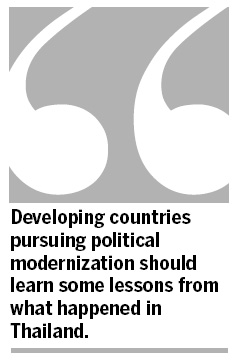Thai dilemma of Western democracy

The weeks-long standoff between government and anti-government forces in Bangkok ended in bloodshed. In a sense, it was contrary to what we have learnt from textbooks. The common view is that democracy brings order to a society and economic development helps form a better political structure. But in the cases of Thailand and several other developing countries, social disorder has followed economic prosperity and political democratization, which can be said to be a dilemma of democracy.
That brings us to the question: Why does the modern concept of democracy, which originated in the West, meet with difficulties in developing countries in the East? Many scholars have attributed that to the immaturity of civil society, weakness of the middle class and/or other economic and cultural reasons. In other words, they have argued that the lack of a solid foundation has made democracy instable and illusive in these societies.
In a country like Thailand, the growing social polarity and deep chasm between the haves and the have-nots have resulted in class opposition. That perhaps is why the red shirts (anti-government protesters) marched the streets of Bangkok to voice their anger against the government. Economic backwardness and cultural differences could be blamed for such inconsistencies, but does that mean true democracy will be established if democratic values are spread and the economy is propelled forward?















